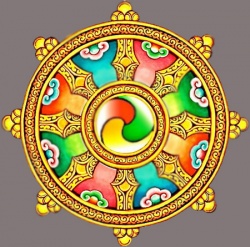Manual of Madhyamika - Reading Seven: How to Fight the Mental Afflictions, Part One
The following reading is taken from the Entry Point for Children of the Victorious Buddhas (rGyal-sras ‘jug-ngogs), a commentary by Gyaltsab Je Darma Rinchen (1364-1432) on the book called Guide to the Bodhisattva’s Way of Life (Byang-chubsems-dpa’i spyod-pa la ‘jug-pa) by Master Shantideva (c. 700 AD).
The third part, which is taking care to eliminate the mental afflictions, has three divisions: considering the problems of mental afflictions; the reasons why it is wrong to feel discouraged over any hardships one may have to put up with during the process of eliminating the mental afflictions; and practicing the emotion of joy over the fact that, should one make serious efforts to eliminate them, the mental afflictions really are something that can be eliminated completely.
The first of these divisions has three parts of its own: considering how the mental afflictions hurt us; reasons why it is wrong to tolerate the mental afflictions; and developing courage for the task of destroying the afflictions. There are four separate steps to the process of considering how the mental afflictions hurt us: thinking about how they leave us powerless; how they send us to unthinkable suffering; how the time that they hurt us is infinite; and the reasons why it is wrong to make friends with the mental afflictions.
The great enemies of anger, desire and the rest
Are not creatures with hands, legs, or the like.
Neither are they great warriors, or wily masters.
So how did it happen, that they
Have made me like their slave?
Our great enemies—”anger and desire and the rest,” which incorporates all the primary and secondary mental afflictions—are not some kind of creatures with hands or legs, that could carry weapons in their hands, or the like. Neither are they great warriors, full of energy, or wily masters who can find clever ways to get what they want. So how did it happen, that these mental afflictions have made me powerless, like I were their slave?
And hurt me at their absolute will,
It’s completely wrong that I should tolerate,
My patience with them is a disgrace.
Here is the second point. The mental afflictions live in my mind, and at their absolute will they hurt me, and drag me to the sufferings of the lower realms, and other kinds of pain. It’s completely wrong that I should tolerate them, and not feel anger for them: my patience with them is a disgrace. Therefore I should see the mental afflictions as my foe, and make great efforts to stop them. We should exert ourselves in studying the definitions, divisions, causes, functions, and other details of the mental afflictions, as presented in the treatises on higher knowledge. Most importantly we must think over and over again about the problems which the afflictions bring to us.
Suppose the mighty pleasure beings, and
Near pleasure beings, all rose to be my enemy;
Still they would never be able to lead me to
The fires of No Respite, and throw me in.
But my great enemies, the powerful mental afflictions,
Can in a single instant throw me into fires so powerful
That if the great Mount Meru were to brush against them
Not even dust would remain.
Suppose the mighty pleasure beings, and near pleasure beings, all rose together as one to be my enemy. Still they would never be able to lead me to the fires of the hell called “No Respite,” and throw me into the fires, so long as I could prevent myself from falling under the power of the mental afflictions. Just one of my great enemies though, one instance of a powerful mental affliction within my own mind, can in a single instant throw me into the fires of this same hell, into fires which are so powerful that—if the great Mount Meru were to brush against them slightly—it would be totally destroyed, and not even dust would remain. Thus I should make great efforts to smash this enemy, the enemy of everything related to the mental afflictions.
This great enemy of mine, the mental afflictions,
Can live for a very long time:
For time without beginning or end.
But there is not a one of my other enemies,
None of the worldly ones, who can live so long.
Here is the third point. Consider now another problem with the mental afflictions. This great enemy of mine, the mental afflictions, can live for a very long time: for time without beginning or end. But there is not a one of my other enemies, none of the worldly ones, who can live so long. If I apply the various antidotes for everything related to the mental afflictions only occasionally, nothing will change at all. Thus I must not only make great efforts to destroy the mental afflictions, but I must do so continuously, in a steady stream like a great river of water.
All look to help you and make you happy,
If you make an effort to relate to them
And serve them in a friendly way;
But if you try to relate to the mental afflictions,
They turn on you—hurt you, and bring you pain.
The other kinds of enemies—that is, the worldly ones—all befriend you, and look to help you and make you happy, if you make an effort to relate to them and serve them in a friendly way, with food and the like. The mental-affliction enemies though are different: if you try to relate to them, or get friendly with them, then they become stronger and stronger; and then they turn on you, and hurt you, bring you pain. The best way to help yourself then is to concentrate on this one task: destroying them completely.
They’ve been thus my constant enemy for a very long time;
And are the one single cause that feeds and nourishes
The entire mass of harmful things.
How could I ever be free of all the terrors
Of cyclic life, and feel gladness so long as
They are rooted and fixed in my very heart?
There are two parts to the explanation of why it is wrong to tolerate the mental afflictions: considering how they hurt the mind, and considering how they hurt the body. Here is the first. They—the mental afflictions—have been thus my constant enemy for a very long time, for time with no beginning: they are the one single and matchless cause that feeds and nourishes the entire mass of harmful things, of suffering and all the rest. How could it ever happen then, so long as these afflictions are rooted and fixed in my very heart, that I could ever reach any point where I was free of all the terrors of cyclic life, and feel any kind of gladness?
Happiness would be an impossibility. I must therefore make true efforts in destroying my mental afflictions.
They are guards for the prison of cyclic life,
For the hells and all the like;
They are butchers that kill you.
How could it ever be possible
That I could have happiness,
So long as they are living
In the net of desire that stays in my mind?
Here is how the afflictions hurt the body. The mental afflictions prevent you from getting beyond the cycle of life, and so they are guards for the prison of cyclic life—they throw you into the dungeon of the hells and all the like. They are also butchers that kill you, whether you are living in the lower realms, or the higher realms. How could it ever be possible then that I could ever have a moment’s happiness, so long as these mental afflictions are living in the net of desire that stays in my mind—that is, so long as they exist among the misimpressions within my thoughts? The answer is that I never could have a moment’s happiness, in my body or my mind.
Even in temporary situations
Where someone does me some minor harm,
I feel anger, pride comes, and until I ruin them
I do not even stop to sleep.
Therefore I must exert myself,
Without letting up in my effort for even a moment,
Until such time as I have directly,
And finally, destroyed this enemy.
Each and every thing which ever happens that I don’t want is caused by something related to the mental afflictions. Therefore the right thing for me to do is to exert myself, without letting up in my effort even for a moment, until such time as I have directly, and finally, destroyed this terrible enemy. Even in the everyday world, in temporary situations such as where someone does me some minor harm, does no more than say a few hard words to me, I immediately feel anger, and then some kind of pride comes where I begin to dwell on hard feelings for the person, and then do whatever I can to ruin this enemy, and don’t even stop to sleep until I do so. If I act this way with worldly enemies then it is completely appropriate then that I make great efforts to smash the other enemy, the mental afflictions.
Here next is the second general division, on the reasons why we should never be discouraged by the hardships necessary to destroy the afflictions. This division has three parts of its own: putting on armor that allows us to destroy the mental afflictions, and refusing to be discouraged by any hardships that this effort brings us; considering the benefits of making every effort to destroy the afflictions; and a description of why it is therefore completely proper to exert ourselves in actually undertaking to destroy the mental afflictions.
There are poor deluded ones who are willing to suffer
For those who are going to die by their very nature;
They advance to war with fanatical hopes of destroying:
Completely ignoring the pain of being hit,
Never to turn back, never to withdraw from the field,
Until they have achieved their aim.
With the true enemy, an enemy who is an enemy by nature,
Who is the cause of all of our sufferings, all the time,
There is no need to say that I must be the same.
Whatever comes, I must never become discouraged,
I must never lessen in my resolve,
Even if it brings me hundreds of sufferings.
Here is the first. There are those “poor deluded ones,” meaning people who are worthy of our pity, who are willing to suffer to kill those who are going to die by their very nature; that is, who will die by themselves anyway, without anyone having to kill them. These people “advance to war,” meaning they go to fight in a war, with fanatical hopes of destroying their enemy. They are so intent on this goal that they completely ignore whatever suffering is inflicted upon themselves, the pain of being hit by some weapon like an arrow or spear. They have decided never to turn back, never to withdraw from the field, until they have achieved their aim of destroying their opponent. We on the other hand are faced with enemies that are the cause of all of our sufferings, all the time. They are the true enemy, a pure enemy: an enemy who is an enemy by nature, and who has always been so, from the moment we were born. There is no need to say that I must be the same as those other fighters: I must never become discouraged, never lessen in my resolve, never lose my warrior’s heart, no matter what hardships I may have to face in the task of destroying this enemy. I must bear with whatever comes, even if it brings me hundreds of sufferings such as cold, hunger, thirst, or anything of the like. And it is right that I must never let up my efforts until I have been able to subdue the enemy of the mental afflictions.
The second part has three sections of its own: how it is right to bear with hardships for the reason that they are a cause for the culmination of my own goals; how it is right to bear with them for the reason that they are a cause for the culmination of the goals of others; and the reasons why I must bring to a final end the pledge I have made before.
Like some ornament for their body
A person treasures even the mark of a wound
Meaninglessly put there by an enemy.
So why should we consider a problem
To attain a very great purpose?
Here is the first. Consider how, in the everyday world, a person treasures, like some ornament for their body, even the mark of a wound that was put there by an enemy for some meaningless reason, over some insignificant thing, and then shows it off to other people, saying “This is how I got this one…” We, on the other hand, have undergone some kind of hardship, some kind of pain, for a very great purpose: that is, in our quest to attain total enlightenment. Why should we consider these pains then a problem? We should rather embrace them, for they can only help us.
Even fishermen, butchers, farmers, and the like
Endure willingly all kinds of harms
Such as cold or heat, thinking of nothing
More important than their livelihood.
Why then shouldn’t someone like myself
For the sake of the living being’s happiness?
Here is the second point. Consider now fishermen, who make their living by killing fish; butchers, the slaughter-house workers who are by tradition considered an inferior caste; farmers, those who make their living through tending the earth; and the like. Even they endure willingly all kinds of harms, such as cold or heat, thinking of nothing more important than their livelihood. Why then should someone like myself not be able to endure hardships for the sake of bringing about every sort of happiness for all living beings? I should endure them.
You have pledged yourself to free all living beings
In the ten different directions from their mental afflictions.
At the same time you have failed to free you yourself
From your own mental afflictions,
Are you not some kind of madman then,
To say so while you’ve failed to judge your own level?
Here is the third point. Someone might make the following statement: “I admit that I am a person who has agreed to undertake the destruction of the mental afflictions within the minds of other persons. It would be wrong though for me to work to destroy the mental afflictions in my own mind, because if I succeeded in doing so I would have fallen into what is called the ‘extreme of personal peace.’” You have though pledged yourself, and developed the wish, to free all living beings, beings as vast in extent as the ten different directions of space itself, from their mental afflictions. If at the same time you have failed to free you yourself from all your own mental afflictions, then you have failed even in the endeavor of accomplishing all your own needs, much less those of others. Are you not some kind of madman then, to say that you are going to free every other living being from their mental afflictions, while at the very same moment you have failed completely to judge your own level—the fact that you yourself are still at the mercy of your own mental afflictions? No one chained in the cycle of suffering of life themselves could ever accomplish all the goals of other living beings, and so you should rather make efforts to destroy the mental afflictions within your own mind.
See Also
- Manual of Madhyamika - Reading One: Author, Structure, and History of the Text
- Manual of Madhyamika - Reading Two: The Benefits of the Wish for Enlightenment
- Manual of Madhyamika - Reading Three: How to Make Offerings
- Manual of Madhyamika - Reading Four: The Four Forces of Purification, Part One
- Manual of Madhyamika - Reading Five: The Four Forces of Purification, Part Two
- Manual of Madhyamika - Reading Six: Taking Joy
- Manual of Madhyamika - Reading Seven: How to Fight the Mental Afflictions, Part One
- Manual of Madhyamika - Reading Eight: How to Fight the Mental Afflictions, Part Two
- Manual of Madhyamika - Reading Nine: Awareness
- Manual of Madhyamika - Reading Ten: The Perfections of Giving and Ethical Living




